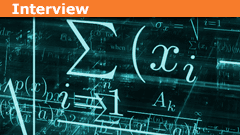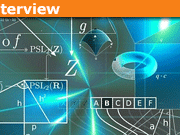Interview with Mathematician Fresh_42
We are please to introduce our newest member of the mentor group, fresh_42!
Can you give us a brief bio?
I studied mathematics and economy and always worked in the periphery of IT. Often as a programmer on various platforms and in various languages, but as well on a hotline, as a software designer, project-, network-, system- or database administrator, maintenance, and even as CIO. Part of this experience is, that I’ve seen quite a few industries and companies from inside and met a lot of people.
What fascinates you about mathematics? Why study it?
This is by far a more personal question than it looks like. To me mathematics has always been a world for idealist and deep in my heart, I’m afraid I am one. You can tell right from wrong, even if it’s sometimes difficult to decide, but the expectation that there is always a solution drives me. It has absolutely no boundaries in the sense, that you can always find new fields of research – known and unknown. To some extend it’s a giant model railroading and I partially blame this property for the fact that there are more male than female mathematicians or as a professor of mine took it: “Mathematical talent is passed from a father on the son-in-law.” Why study it? Be careful with your wishes. Once you really know statistics and logic, political talk-shows will become even harder to stand as they are anyhow. On the other hand, there are only two languages known by mankind, which are universally valid: mathematics and music. It’s not by chance that many mathematicians play an instrument. Unfortunately, I don’t.
What parts of your education/training were difficult and how did you overcome them?
The most difficult part has been to take economists for serious. They have a completely different mentality and I’m not sure I overcame it. Where mathematicians look for rigor, economists are happy with practicable solutions whether they are exact or not. If needed I learnt the subject by heart. However, I guess different mentalities have to be faced by all STEM students out there in real life.
Share with us some of your work experiences/positions.
As you’ve seen in the first answer or the previous, they are colorful and manifold. And the anger of absurdities or the moments of joy have become milder or even faded as years have gone by. I could answer with quite a few anecdotes, but I assume this is not the purpose of this question.
One important experience and lesson learnt is not to underestimate the human factor, something mathematicians tend to neglect. The decision processes in real life are far less rational than one expects them to be and many decisive aspects are unseen and hidden, which makes them easy pitfalls. I have good reasons why “The Deadline” from Tom DeMarco is one of my favorite books. As a student I was part of the self governing body of our faculty. You won’t believe me how childish or illogical mathematicians can be, if they aren’t observed by the “normal world” or – as always – it comes to the budget or vacant positions.
What are some of your favorite science and technology attractions in Germany?
I should say the Miniatur-Wunderland in Hamburg as the world’s largest model railway exhibition according to what I’ve said about mathematics. But we also have a mathematics museum which is pretty well built, especially when you have kids. Another rather big Museum that contains more than can be visited in one day is the Deutsche Museum in Munich. Both have a lot of experiments and toys as part of the exhibition. I still remember when I first saw Foucault’s pendulum hanging from a 60 meter high ceiling with a clock on the ground, or a person sitting in a Faraday cage and a lightning stroke it, or looking at the model of a mine.
And, don’t ask me how they got it, but there is an amusement park in the south, where they have the inside of a soviet submarine and the original practice module of the MIR. That has been really impressive to walk through. O.k. I had to steal the time because all others wanted to get to the next roller coaster, but I won’t forget how it felt to be inside the MIR.
Is there a recent development in science/tech that excites you?
The LHC as the biggest machine mankind has ever built excites me a lot. I am as curious about their findings as everybody else hopefully is. I find the other great achievement of our times, the discovery of exoplanets less exciting, as they are so far away that we might not find out a lot about them and even a potentially thinkable communication is impossible. On the other hand, I admire the various telescope systems in Chile like the VLT and E-ELT and on Mauna Kea. Guess I like it big. Unbelievable what has been achieved since Galileo first looked through some glasses just a while ago. And now that we can remove atmospheric disturbances by calculations, it’s getting even more exciting. And again there is a pattern that can be seen: all these projects involve multilateral projects and science, which is a big part of why I like them. They prove, that there is hope for mankind.
What would you say is your favorite equation or math concept and why?
It would be a sin not to answer with Euler’s identity eiπ+1=0eiπ+1=0. It contains all mathematics in just seven signs:
ee as the most natural number in the world, ππ as the sign of perfection, ii as what mankind can achieve by imagination, ++ as the first operation of all, 11 as the multiplicative identity, == as symbol what it is about in mathematics and 00 as our first mathematical achievement some 7,000 years ago in India. You cannot express the beauty of mathematics in a more beautiful way in less signs.
What person in history would you most like to meet and what would you ask them?
This is difficult to answer, as I assume that every time has its own language which we nowadays do not necessarily understand, and I don’t mean the words. So I expect great problems the more I go back in time. That leaves me with Albert Einstein as I assume he’s been complicated enough not to be boring and funny enough to be sarcastic. I would ask him personal questions as the answers to all others can be found in textbooks.
What are some of your favorite movies, books and musicians?
I like Tarantino movies a lot, and all kinds of Sci-Fi, especially those with time paradoxes. I’ve already mentioned “The Deadline” from Tom DeMarco. I also like Stanislaw Lem a lot, especially his short stories. My famous musicians are Beethoven, Tchaikovsky, Verdi and Metal, like Motörhead (RIP, Lemmy!)
How did you happen upon Physics Forums and why is it important to you?
I found PF by chance via my Facebook preferences and don’t remember why I posted for the first time. I love PF because – and here the circle closes in – it stands for the idealism in this world. PF spans literally the whole world and its only purpose is to spread knowledge and science. What a marvelous light in a world that appears to be so dark. I’m old enough to know, that internet once meant some email and paperwork exchange among universities and the lengths of Ethernet wires were important. And now I’m talking to a guy in Tasmania in the middle of the night about mathematics, and someone from Oregon steps in and contributes to the discussion. And the best part is, it’s science we talk about and culture or language are completely irrelevant. We all speak the same language. I wished I could say this about our politicians, regardless where.
One of the great, and often underestimated aspects of PF are its quotes and references to scientific work and books that are openly and freely available. I have already downloaded more good books and papers than I can read for the rest of my life. What a treasure trove! I hope I can give some of it back and help some of the many students who search help when they got stuck.
I have a BS in Information Sciences from UW-Milwaukee. I’ve helped manage Physics Forums for over 22 years. I enjoy learning and discussing new scientific developments. STEM communication and policy are big interests as well. Currently a Sr. SEO Specialist at Shopify and writer at importsem.com








One small nit: The Euler formula is not showing up as it should:
##e^{i\pi} + 1 = 0##
Ummm……
ref: http://www.economicsonline.co.uk/Competitive_markets/What_is_economics.html
ps. I didn't believe it at first either. But if you think about it for about 15 seconds, it makes sense.
———–
Student; "What the hell is Economics, really?"
Professor Om; "Economics is the study of herding human cats."
One economist at my institution claims economics is a social science.
CheersI think it is in many aspects, but I also think that the social sciences are going to be endured by mathematics at some point, you can do, and it is actually done, some hard predictions in social sciences. You can actually model some social phenomena and behavior using physical models, I have seen some papers on this kind of topics, applying some statistical mechanics equation that describes some nucleation process to the formation of the centers of cities, or some kinetic gas equation to describe evacuation in emergency situations for some building and staff like that. It is pretty gross for what "social" means, but as science advances, I think we are going to see more and more of this. At this point people can see the activation of neurons one by one, all this techniques will have an impact in psychology and sociology, all the advances in neurosciences will have an impact in the future on how all those disciplines like social sciences and psychology are driven.
Interview with Mathematician Fresh_42. Nice. Enjoyed reading it.
One economist at my institution claims economics is a social science.
Cheers
… Perhaps "Economics" should be a sub-category of "Quantum Physics"?- indeed, why not? Feynman suggested that Physics / Nature might well be something like the Great Game played by some hidden Players – and the most interesting games have some "economical" aspect – suppose that those Players have to pay somehow for making improbable quantum choices – and that's how the Born Rule actually emerges . . .
I think the economist comments are interesting. Certainly there is a lot of math in economics, but it's interesting they have s more fluid ranges of acceptable solutions.hmmmm….. Perhaps "Economics" should be a sub-category of "Quantum Physics"?
I think the economist comments are interesting. Certainly there is a lot of math in economics, but it’s interesting they have more fluid ranges of acceptable solutions.